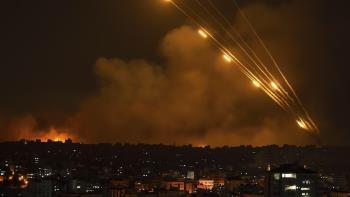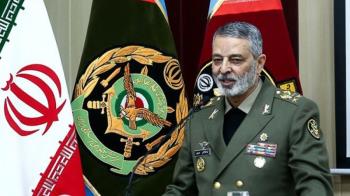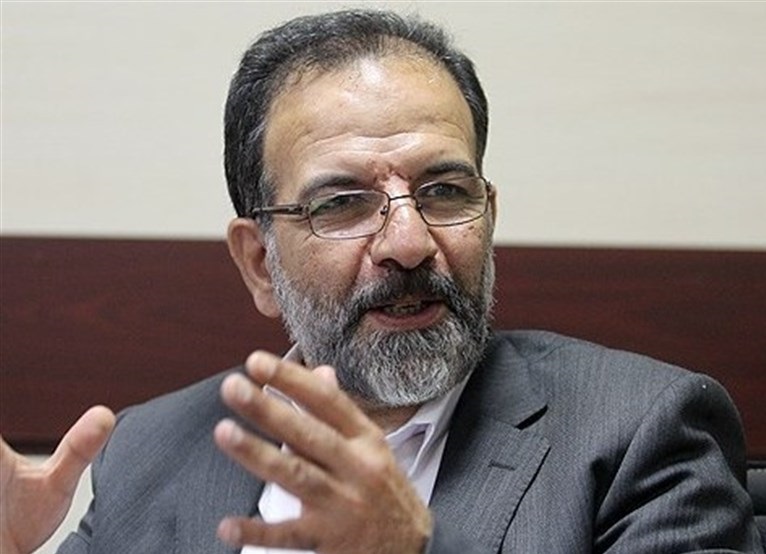Alwaght- Over the past few days, an Israeli drilling ship entered into the disputed waters with Lebanon for gas exploration from Karish gas field and refueled tensions with Lebanon. Reports suggested that the ship passed the Line 29 area and crossed into Line 23 area in the disputed waters with Lebanon, triggering strong-toned reactions from Lebanese political officials.
The Israelis, on the other hand, have strengthened their defense systems to support their sea installations against Hezbollah threats. Meanwhile, according to the US State Department, Amos Hochstein, the US State Department's senior advisor on energy security, will visit to Lebanon on June 13 and 14 for mediation efforts between the two sides.
The entry of the US envoy as a mediator comes at a time when the two sides are at loggerheads over an area of 860 square kilometers of oil and gas resources, according to plans submitted by Lebanon and the Israeli regime to the UN. In October 2020, indirect talks brokered by the US between the two sides began under the auspices of the UN over the disputed maritime borders, and five rounds of talks were held since then, the last of which was in May 2021. In this regard, Beirut delegation presented a new map in one of the rounds, in which it considered another 1,430 kilometer as part of the waters of the Lebanese region and declared the disputed area to be 2,290 square kilometers. Tel Aviv rejected the argument and the talks were halted.
To discuss various aspects of the dispute, Alwaght talked to Jaafar Ghanadbashi, an Iranian expert of West Asia affairs.
The US mediation an Israeli dictate
Concerning the plans of the US envoy Hochstein for mediation, Mr Ghanadbashi said that the US resorting to an envoy shows that Washington and Tel Aviv believe that the Lebanese are steady and serious in pursuit of their maritime borders rights and are not inclined to retreat from their interests in favor of the Israeli regime.
"This American and Israeli notion is mainly a result of Hezbollah chief Sayyed Hassan Nasrallah's resolute message. He said we are resolute in our defense of Lebanon's national interests and ready to confront illegitimate Israeli actions. The US and Israel are confident of Hezbollah's power and capability to react to any violations. So, they resorted to mediation. Concerning the goals of Amos Hochstein, the issue is very clear, which is to defend the interests and security of the Israeli regime in the region. Based on the continuous strategy of various US presidents over the decades to defend the security and existence of the Israeli regime, the Biden government now intends to walk the same path by sending an envoy. In general, it should be noted that the mediation of the American envoy is an Israeli dictate. Basically, Hochstein can be considered a representative of the Israeli regime with a fake nature and soft language."
The Lebanese can respond to the Israeli actions
Asked about the Lebanese capabilities to respond to the Israeli military activities in the dispute waters, Mr Ghanadbashi held that contrary to the Israeli and American propaganda, the Israeli regime is largely vulnerable in security and military areas. The Muslim world public are against Tel Aviv, too. In fact, any spark of war would unleash massive threats against Tel Aviv. Hezbollah showed off parts of its military might in 2006 during the 33-Day war, demonstrating to the Israelis how shallow their power is. This comes while in the past to decades, Hezbollah added to its military capabilities and honed its combat skills, gaining more power to threaten the Israeli regime. In recent years, attacks by Palestinian resistance forces in response to Israeli aggression in the Gaza Strip and the West Bank have clearly demonstrated the vulnerability of the Israelis and their inability to repel attacks by resistance forces.
"Therefore, it can be boldly emphasized that Hezbollah in Lebanon is capable of a military confrontation with Tel Aviv."
Logical calculations should dissuade Tel Aviv from war with Lebanon
Commenting on the Israeli readiness to wage a war on Lebanon on the disputed waters, Mr Ghanadbashi suggested that based on logical calculations, the Israelis should not think of another war since they would incur heavy security and military damages. But the Israelis have shown that their decisions are influenced by the emotions and ignore logic. "An example is their silly war on Gaza in 2021 and their approval of ceasefire after sustaining massive damages."
Filing legal suit against Israel not fruitful
In his final words, the Iranian expert talked about the Lebanese government's solutions to realize its rights against maritime borders, saying that the logical solution to this issue is unity of all Lebanese factions over the readiness to counter the Israeli violations and taking the case to the international legal organizations.
"As long as there is disunity in Lebanon, we should not expect the international organizations to seriously look into Lebanese legal cases. Still, we should know that the language of today's world order is not peace, reconciliation and logic, rather it is force and military might. So, we should not be very much optimistic about fruitfulness of the legal cases against the Israeli regime."



























